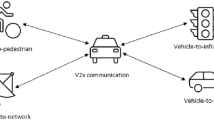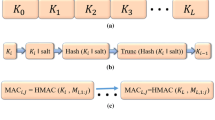Abstract
The rapid expansion in research has led to vast interest in intelligent transport systems (ITSs), especially vehicular ad hoc networks (VANETs), which include communication among smart vehicles by using built-in sensors. Authorizing these vehicles and preserving their privacy while sharing messages play an important role in secured data transmission. Messages should be signed by vehicles and verified between legitimate entities to establish trust and decrease security risks. Traditional protocols operate in a centralized mode, where a trusted authority (TA) is tasked with authorizing secure communication between vehicles and bears the computational costs for the security operations for every entity in a VANET. Lightweight and secure solutions are important to ensure the advancement of wireless communication by preventing malicious users. This article presents a lightweight privacy-preserving signature-based authentication (LPPSA) protocol that solves the limitations of state-of-the-art protocols while reducing the computational burden on a TA. The proposed LPPSA protocol takes advantage of the short elliptic curve cryptography (ECC) parameters and leverages the Diffie-Hellman key exchange algorithm to generate shared secret keys. The roadside unit (RSU) plays a major role in assisting this authentication process and helps in reducing the overall computational complexity of a TA. The RSU provides lightweight secure authentication along with malicious vehicle revocation. The performance analysis and comparison with similar protocols show that the proposed LPPSA is more efficient, as it reduces the security risks and lowers the computational complexity of the overall system.





Similar content being viewed by others
References
Qu F et al (2015) A security and privacy review of VANETs. IEEE Trans Intell Transp Syst 16.6:2985–2996
Wei Z, et al. (2019) A lightweight privacy-preserving protocol for vanets based on secure outsourcing computing. IEEE Access 7:62785–62793
Yadav KA, Vijayakumar P (2016) VANET And its security aspects: a review. Indian J Sci Technol 9.18:104–118
Manivannan D, Moni SS, Zeadally S (2020) Secure authentication and privacy-preserving techniques in Vehicular Ad-hoc NETworks (VANETs). Vehicular Communications, pp 100247
Singh LD, Singh KM (2015) Implementation of text encryption using elliptic curve cryptography. Procedia Comput Sci 54:73–82
Cilardo A, et al. (2006) Elliptic curve cryptography engineering. Proc IEEE 94.2:395–406
Eze EC, Zhang S, Liu E (2014) Vehicular ad hoc networks (VANETs): current state, challenges, potentials and way forward. In: 2014 20th International Conference on Automation and Computing, IEEE
Vijayakumar P, et al. (2015) Dual authentication and key management techniques for secure data transmission in vehicular ad hoc networks. IEEE Trans Intell Transp Syst 17.4:1015–1028
Bao S, et al. (2018) A lightweight authentication and privacy-preserving scheme for VANETs using TESLA and bloom filters. ICT Express 4.4:221–227
Liu X, et al. (2019) An Authentication Scheme in VANETs Based on Group Signature. In: International Conference on Intelligent Computing. springer, Cham
Lai C, et al. (2017) Secure group communications in vehicular networks: a software-defined network-enabled architecture and solution. IEEE Veh Technol Mag 12.4:40–49
Wang B, Yi W, Chen R (2019) A practical authentication framework for VANETs. Security and Communication Networks 2019
Tangade S, Manvi SS, Lorenz P (2018) Decentralized and scalable privacy-preserving authentication scheme in VANETs. IEEE Trans Veh Technol 67.9:8647–8655
Zhou Y, et al. (2018) An efficient V2I authentication scheme for VANETs. Mobile Information Systems 2018
Ismail Md, Chatterjee S, Sing JK (2018) Secure biometric-based authentication protocol for vehicular ad-hoc network. In: 2018 IEEE International Symposium on Smart Electronic Systems (iSES)(formerly iNiS). IEEE
Wang F et al (2015) 2FLIP: A two-factor lightweight privacy-preserving authentication scheme for VANET. IEEE Trans Veh Technol 65.2:896–911
Sandou D, Kiruba N, Jothy, Jayanthi K (2018) Secured routing in VANETs using lightweight authentication and key agreement protocol. In: 2018 International Conference on Wireless Communications, Signal Processing and Networking (WiSPNET) IEEE
Balaji N, Alangudi R, Sukumar, Parvathy M (2019) Enhanced dual authentication and key management scheme for data authentication in vehicular ad hoc network. Comput Elect Eng 76:94–110
Zheng D et al (2019) A traceable blockchain-based access authentication system with privacy preservation in VANETs. IEEE Access 7:117716–117726
Tan H, Chung I (2019) Secure authentication and key management with blockchain in VANETs. IEEE Access 8:2482–2498
Zhou J et al (2019) LPPA: lightweight privacy-preserving authentication from efficient multi-key secure outsourced computation for location-based services in VANETs. IEEE Trans Inform Forensics Secur 15:420–434
Tan H, Gui Z, Chung I (2018) A secure and efficient certificateless authentication scheme with unsupervised anomaly detection in VANETs. IEEE Access 6:74260–74276
Cui J et al (2018) An efficient message-authentication scheme based on edge computing for vehicular ad hoc networks. IEEE Trans Intell Transp Syst 20.5:1621–1632
Gao T et al (2018) PAAS: PMIPV6 access authentication scheme based on identity-based signature in VANETs. IEEE Access 6:37480–37492
Chikhaoui O et al (2018) Towards the formal validation of a ticket-based authentication scheme for VANETs. In: 2018 32nd International Conference on Advanced Information Networking and Applications Workshops (WAINA). IEEE
Ma M et al (2019) An efficient and provably secure authenticated key agreement protocol for fog-based vehicular ad-hoc networks. IEEE Internet Things J 6.5:8065–8075
Cui J et al (2017) SPACF: A secure privacy-preserving authentication scheme for VANET with cuckoo filter. IEEE Trans Veh Technol 66.11:10283–10295
Zhong H et al (2017) Conditional privacy-preserving authentication using registration list in vehicular ad hoc networks. IEEE Access 6:2241–2250
Burrows M, Abadi M, Needham RM (1989) A logic of authentication. Proceedings of the Royal Society of London. A. Mathematical and Physical Sciences 426.1871:233–271
Author information
Authors and Affiliations
Corresponding author
Ethics declarations
Conflict of interest
The authors declare no competing interests.
Additional information
Author contribution
Kirti A. Yadav and Vijayakumar P designed the model and computational framework. Kirti A. Yadav developed the theory and performed the computations along with verifying the analytical methods. Vijayakumar P encouraged Kirti A. Yadav to investigate and supervise the findings of this work. Both authors discussed the results and contributed to the final manuscript.
Code availability
The code is available in a private Git repository (https://github.com/yadav10/ECC-Message-VANET). Access can be made available whenever necessary.
Publisher’s note
Springer Nature remains neutral with regard to jurisdictional claims in published maps and institutional affiliations.
Rights and permissions
About this article
Cite this article
Yadav, K.A., Vijayakumar, P. LPPSA: an efficient Lightweight Privacy-Preserving Signature-based Authentication protocol for a vehicular ad hoc network. Ann. Telecommun. 77, 473–489 (2022). https://doi.org/10.1007/s12243-021-00897-1
Received:
Accepted:
Published:
Issue Date:
DOI: https://doi.org/10.1007/s12243-021-00897-1




